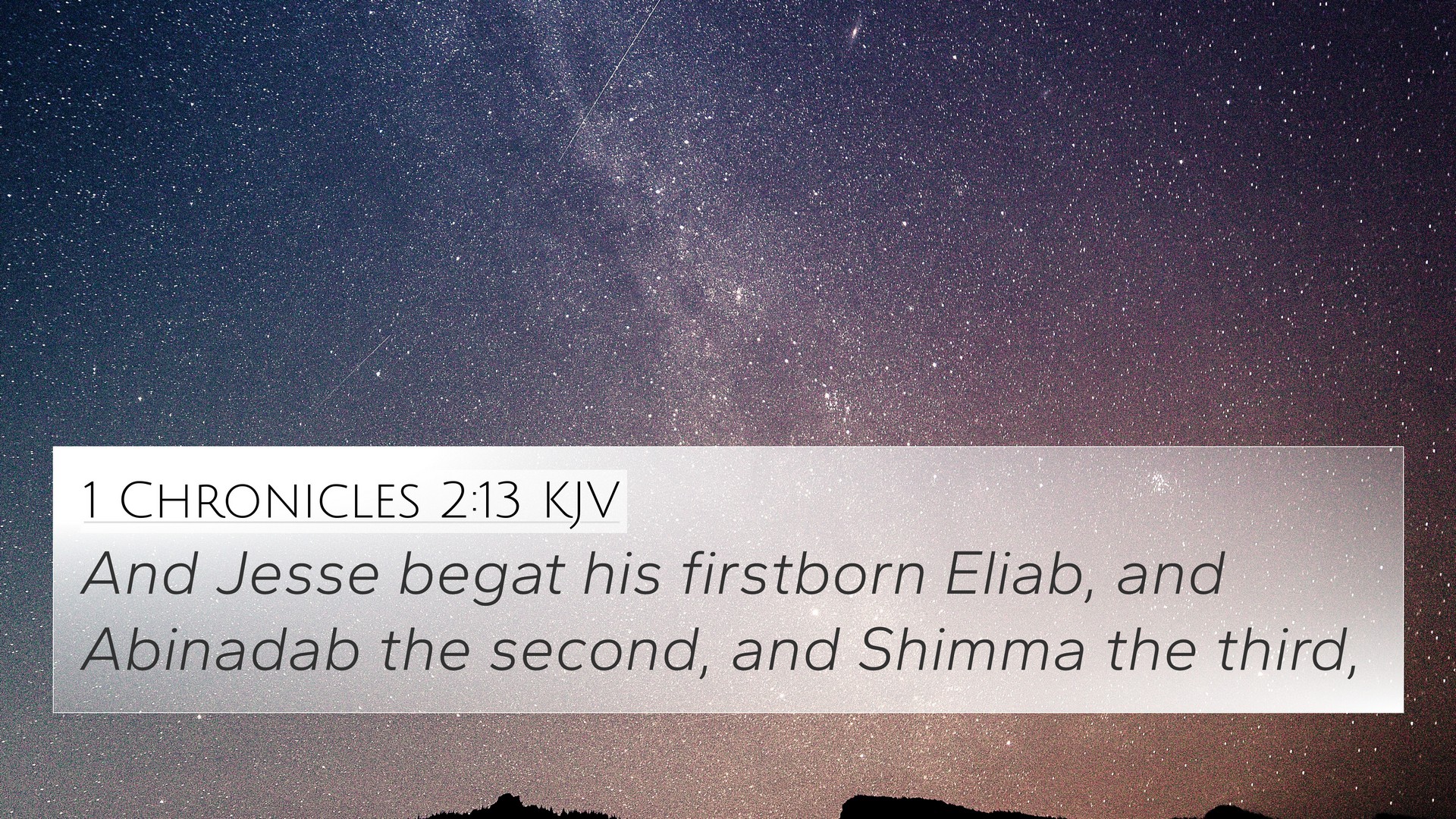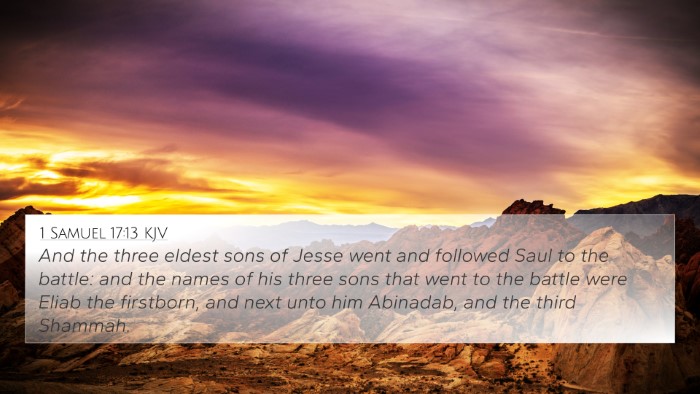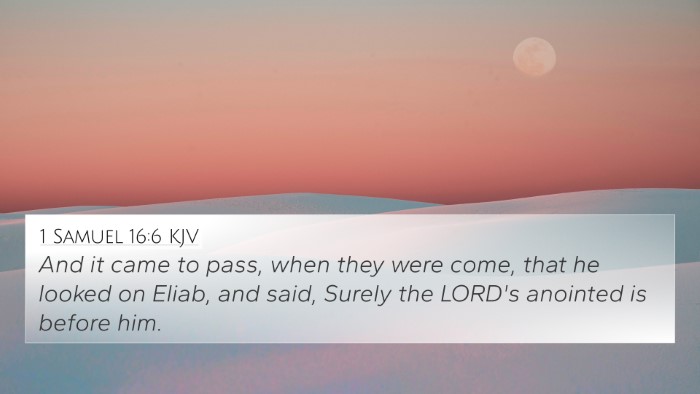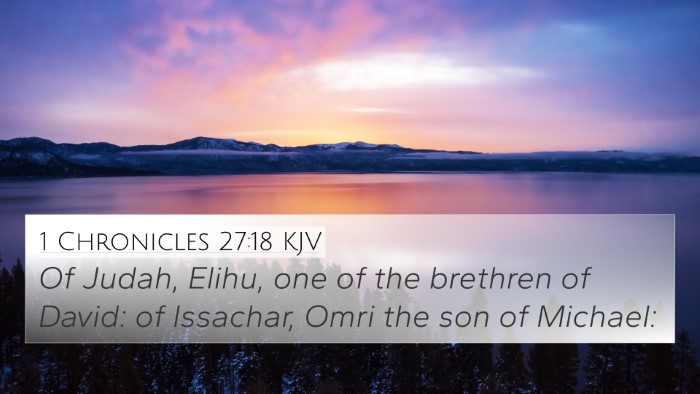Understanding 1 Chronicles 2:13
1 Chronicles 2:13 states: "And Jesse begat his firstborn Eliab, and Abinadab the second, and Shimea the third." In this verse, we are introduced to the lineage of Jesse, who is noted as the father of King David. The genealogical significance of these names establishes not only the heritage of David but also highlights the fulfillment of God’s promises to Israel.
Commentary Insights
- Matthew Henry: Henry emphasizes the importance of genealogies in Scripture, noting that they affirm God’s providence in preserving the righteous lineage. The mention of Eliab, Abinadab, and Shimea marks not merely familial relationships but serves to connect David’s royal ancestry, symbolizing divine election.
- Albert Barnes: Barnes focuses on the significance of Jesse’s family, pointing out the characteristics of Eliab and others, who serve as representations of God's faithful servants. He brings attention to the spiritual implications of their roles in Israel's history and God’s redemptive plan.
- Adam Clarke: Clarke provides a critical analysis of the names and their meanings, linking them to the broader narrative of Israel's history. He highlights how these characters serve as conduits of God’s blessings and judgments, framing their stories as pivotal in the unfolding of God’s covenant promises.
Bible Verse Cross-References
- 1 Samuel 16:6-7: This passage recounts the anointing of David and how God looks at the heart rather than outward appearance, connecting to the significance of Jesse’s sons as potential leaders.
- Matthew 1:6: Here, Jesse’s role as the ancestor of Jesus Christ is directly referenced, establishing the Messianic link between the Old and New Testaments.
- Ruth 4:22: This verse highlights the lineage from Boaz to Jesse, emphasizing God's faithfulness in preserving His line through challenges.
- 1 Chronicles 2:12: Directly precedes our focus verse, providing context on the genealogy as an integral part of biblical history.
- Romans 1:3: Paul writes about Jesus being a descendant of David, connecting the New Testament and Jesus’ earthly lineage back to Jesse.
- Psalms 78:70-72: This reflects on God choosing David from among his brothers, reinforcing the significance of Jesse's family in God's plan.
- 1 Corinthians 10:11: Discusses the importance of Old Testament examples, including genealogies, for teaching and admonition in the New Covenant.
Thematic Connections
This verse serves as a notable example of Bible verse parallels and the practice of Bible cross-referencing. By examining genealogies, we may connect various biblical themes:
- Divine election and purpose within family lines.
- The preservation of God’s promises through generations.
- The announcement of significant biblical figures and their roles in God's redemptive narrative.
Cultural Historical Context
The genealogies found in 1 Chronicles are essential for understanding the cultural and historical context of Israel. These records were vital for establishing rights to land, priestly duties, and royal succession. They serve to remind readers of God's sovereignty and His intimate involvement in the lineage of His people.
Application for Believers
As contemporary readers of the Scripture, understanding verses like 1 Chronicles 2:13 encourages a deeper connection to the history of faith that precedes us. It emphasizes God’s faithfulness to His promises and the interplay between human decisions and divine providence.
Tools for Bible Cross-Referencing
To explore these connections meaningfully, believers can utilize several tools for Bible cross-referencing, such as:
- Bible concordances for word studies.
- Cross-reference Bible study guides that outline thematic connections.
- Study Bibles with integrated references to related verses.
- Online resources that allow for text comparisons and thematic searches.
Final Thoughts
Engaging in Comparative Bible verse analysis can enrich one’s understanding of Scripture, allowing for a richer interpretation of how God speaks through His Word. By exploring the connections between Bible verses that relate to each other, believers gain insight into the cohesive narrative of biblical revelation.







